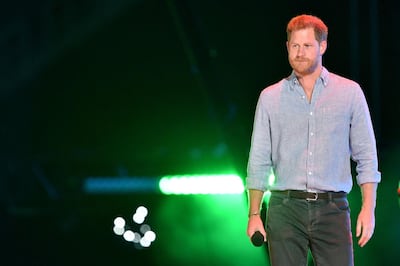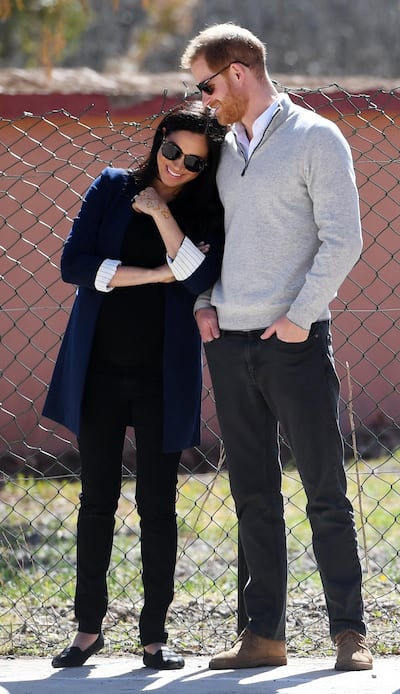Prince Harry is not holding back on his feelings about his family, including his father, in a new five-part documentary series that premiered on Apple TV+ on Friday.
In The Me You Can't See, co-produced by Prince Harry and Oprah Winfrey, the former royal sits down with the media mogul for an emotional talk about mental health. In it, the Duke of Sussex stresses that his family turned a blind eye to the struggles of his wife Meghan Markle, and says he will "never be bullied into silence".
Prince Harry also speaks about how his mother Princess Diana's death in 1997 pushed him to drugs and alcohol "to numb the pain".
The series comes out a day after the release of an independent inquiry in Britain that found that BBC journalist Martin Bashir used falsified documents to land a sensational 1995 sit-down with Diana, in which she detailed her troubled marriage to Prince Charles.
Here are six shocking revelations from The Me You Can't See:
He abused drugs and alcohol to numb the pain of his mother's death

Prince Harry, 36, who has spoken before about the trauma of losing Diana in a Paris car crash and then having to walk as a 12-year-old behind his mother's coffin in her funeral cortege under the glare of the world's media, says he abused alcohol and drugs to numb the pain of losing his mother.
"I was willing to drink, I was willing to take drugs, I was willing to try and do the things that made me feel less like I was feeling," he tells Winfrey. "I would probably drink a week's worth in one day on a Friday or a Saturday night and I would find myself drinking not because I was enjoying it but because I was trying to mask something."
The loss of his mother accentuated fears about his own wife Meghan when she grappled with suicidal thoughts, although he says the British royal family neglected them both.
He suffered from panic attacks and anxiety in his 20s
Harry says he buried his feelings for many years and still freaks out when he sees cameras.
"I was so angry with what happened to her [Diana] and the fact there was no justice at all ... the same people that chased her through that tunnel photographed her dying on the back seat of that car," he says.
"The clicking of cameras, and the flash of cameras makes my blood boil. It makes me angry. It takes me back to what happened to my mum, what I experienced as a kid."
He felt helpless he couldn't help his mother Diana

In the documentary, Harry speaks of walking behind Diana's coffin through the streets of London with his brother Prince William, father Prince Charles and uncle Earl Charles Spencer.
"The thing I remember most was the sound of the horses' hooves going along the Mall," he says. "It was like I was outside of my body, just walking along, doing what was expected of me, showing one tenth of the emotion that everyone was showing."
Years earlier, he recalled sitting in the back of his mother's car while she, in tears, was pursued by photographers.
"One of the feelings that comes up for me always is the helplessness. Being a guy and being too young to help a woman, in this case your mother, and that happened every single day," he says.
He reiterates his family lacks empathy

The British royal family turned a blind eye to his and Meghan's mental health struggles, Prince Harry says.
"I thought my family would help, but every single ask, request, warning, whatever it is, just got met with total silence or total neglect," he says, singling out his father.
"My father used to say to me when I was younger, to both William and I: 'It was like that for me, so it's going to be like that for you.' That doesn't make sense. Just because you suffered that doesn't mean that your kids have to suffer.
"In fact quite the opposite. If you suffered, do everything you can to make sure that whatever negative experiences that you had, you can make it right for your kids," Prince Harry says.
He was scared to attend his grandfather's funeral

Returning to London to attend Prince Philip's funeral last month meant once more facing a place where he felt trapped and hunted by cameras, Prince Harry says. It would be a test of his ability to cope with the anxiety that was bubbling up again.
"I was worried about it, I was afraid," Harry told The Associated Press while promoting The Me You Can't See.
He was able to work through any trepidation using coping skills learnt in therapy. "It definitely made it a lot easier, but the heart still pounds," he says.
Meghan helped him realise the importance of mental health
Prince Harry also details his experience with therapy, saying it has "equipped me to be able to take on anything" and especially helped him cope with the death of his mother when he was 12.
"I knew that if I didn't do the therapy and fix myself that I was going to lose this woman who I could see spending the rest of my life with," he says, also saying that being with Meghan helped him realise the importance of mental health.
He says he began serious therapy about five years ago.
The Duke and Duchess of Sussex, who announced in January 2020 that they would quit frontline royal duties, have relocated to California, where Meghan is from.
– 'The Me You Can't See' is now streaming on Apple TV+. Additional reporting by Reuters, AP and AFP
______________________
Read more:
Prince Harry and Meghan Markle celebrate third wedding anniversary: a royal romance in pictures
______________________



